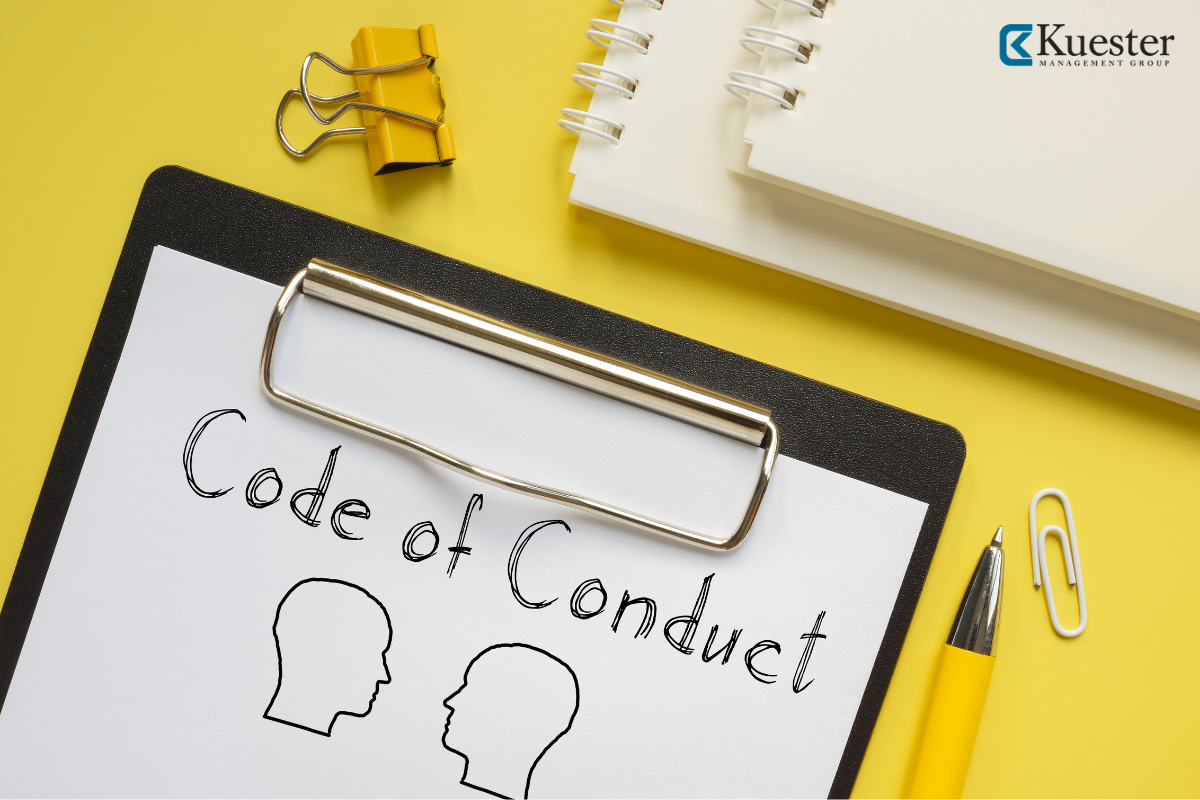Contents
Homeowners’ associations (HOAs) thrive when their boards lead with integrity, fairness, and accountability. Yet, without clear guidelines, even the best-intentioned board can face conflict, mistrust, and legal risks. That’s where a code of conduct comes in.
A well-crafted code of conduct for HOA board members sets expectations for behavior, outlines responsibilities, and establishes a foundation of trust between the board and the community it serves. It is not just a formality–it’s an essential tool for good governance.
In this blog, we’ll explore what a code of conduct is, why it matters, and how it protects both the board and the homeowners. We’ll also highlight how Kuester Management Group, as a premier HOA management services in Charlotte, Huntersville NC, Wilmington NC, Myrtle Beach SC, and Fort Mill SC helps reduce board liability and improve compliance by guiding associations in adopting and upholding a comprehensive code of conduct.
What Is a Code of Conduct for HOA Board Members?
A code of conduct is a written document that defines the standards of behavior, responsibilities, and ethical obligations expected of board members. It sets boundaries on how board members should act in their official capacity, ensuring decisions are made in the best interest of the community rather than personal agendas.
Think of it as a playbook for professionalism. While the HOA’s bylaws and state laws cover the what of governance, the code of conduct explains the how.
For example, bylaws may say the board is responsible for collecting assessments. The code of conduct explains that board members must approach this responsibility with fairness, confidentiality, and consistency.
Code of Conduct vs. Code of Ethics
The terms are often used interchangeably, but there’s a difference:
- Code of Ethics: Focuses on broader moral principles such as honesty, integrity, and fairness.
- Code of Conduct: Provides specific rules and standards of behavior that guide day-to-day interactions and decision-making.
Most HOAs benefit from having both, but the code of conduct is particularly important because it sets practical, enforceable expectations.
Why Every HOA Board Needs a Written Code of Conduct

A code of conduct establishes a shared standard that guides how board members interact with one another, with homeowners, and with vendors or partners.
Here’s why having a code of conduct is so essential:
- Builds trust: Homeowners are more likely to respect and support board decisions when they know those decisions are made under clear standards. Transparency and accountability reassure residents that the board is acting in the community’s best interests.
- Prevents misconduct: A well-crafted code helps reduce the risk of conflicts of interest, favoritism, misuse of HOA funds, or abuse of authority. When everyone understands the boundaries, there’s less room for unethical behavior or misunderstandings.
- Improves professionalism: Serving on a board may be voluntary, but it comes with serious responsibility. A code of conduct elevates the role by ensuring members treat it with the same seriousness as any professional leadership position. This helps maintain order during meetings and fosters a culture of respect.
- Reduces liability: In many cases, board decisions can face legal scrutiny. A written code demonstrates that the board is acting in good faith, following established standards, and prioritizing the community’s welfare. This documentation can help minimize personal and organizational liability.
- Guides conflict resolution: Disagreements and disputes are inevitable in community management. A code of conduct provides a neutral framework to address these conflicts fairly and consistently, which reduces tension and ensures that issues don’t escalate unnecessarily.
In short, a code of conduct is not just a best practice–it’s a foundation for a strong, ethical, and effective HOA board.
Common Components of an HOA Board Code of Conduct
While each community may customize its code of conduct to fit its unique needs, most contain a set of core elements that establish clear expectations for board behavior. Below are the most common components, along with why they matter:
- Confidentiality
Board members frequently deal with private information such as delinquent homeowner accounts, violation notices, personnel matters, or legal advice from the association’s attorney. A code of conduct ensures this information remains confidential and is not shared with neighbors, friends, or on social media. Breaches of confidentiality can damage reputations, expose the HOA to liability, and erode homeowner trust. - Professionalism
Even though HOA boards are made up of volunteers, the responsibilities should be treated with the same seriousness as any professional role. This means showing respect during meetings, responding appropriately to homeowner concerns, and handling disagreements with civility. Professionalism sets the tone for the entire community and prevents conflicts from escalating into personal disputes. - Impartiality
Board members are elected to represent the interests of the entire community–not their own household or a particular group of homeowners. Impartiality means making decisions based on fairness, facts, and the governing documents, rather than personal friendships, political agendas, or convenience. This helps avoid favoritism and ensures equal treatment of all residents. - Financial Responsibility
Board members are stewards of the association’s budget and reserve funds, which can amount to hundreds of thousands of dollars in larger communities. A code of conduct emphasizes the obligation to spend community money wisely, approve expenditures transparently, and avoid waste. Mismanagement of funds not only harms the HOA financially but can also lead to lawsuits or state intervention. - Conflict of Interest
Transparency is critical to maintaining trust. A strong code of conduct requires board members to disclose any personal interest in matters before the board, such as awarding contracts to relatives, hiring personal businesses, or negotiating deals that benefit them personally. Members with conflicts should recuse themselves from voting or discussions on the matter to prevent the appearance of impropriety. - Meeting Conduct
HOA meetings should follow a structured agenda and recognized rules of order. The code of conduct typically outlines how meetings should be run, how homeowner comments are managed, and expectations for board member behavior. Disruptive conduct, such as shouting, interrupting, or ignoring procedure, undermines the board’s credibility and prevents productive decision-making. - Compliance with Governing Documents and Laws
HOA boards are legally bound to follow state statutes, the community’s bylaws, CC&Rs (Covenants, Conditions, and Restrictions), and other governing documents. A code of conduct reinforces the obligation to operate within these rules consistently. This prevents selective enforcement, helps avoid lawsuits, and protects board members from claims of negligence or misconduct. - Fair Enforcement of Rules
Nothing damages homeowner trust faster than selective enforcement. A strong code requires that community rules, such as parking restrictions, landscaping standards, or noise policies, be applied consistently to everyone. If some residents are given a “free pass,” while others are penalized, the board risks losing credibility and inviting legal challenges. - Respect for Homeowners and Fellow Board Members
Disagreements will inevitably occur, both among board members and between the board and homeowners. The code of conduct should require that all interactions remain civil, respectful, and focused on the issue rather than the individual. This not only keeps meetings more productive but also sets a positive example for the community. - Use of HOA Resources
HOA property, equipment, funds, and vendor relationships are for the benefit of the entire community–not individual board members. A code of conduct should prohibit members from using HOA resources for personal gain, such as storing personal items on HOA property, leveraging their position to influence vendors, or misusing association credit cards. Misuse of resources erodes trust and may expose the HOA to financial risk.
What Happens Without a Code of Conduct?

Communities without a code of conduct often face:
- Frequent disputes: Homeowners may feel decisions are biased or unfair.
- Inconsistent enforcement: Without standards, rules may be applied unevenly.
- Loss of trust: Transparency suffers when boards appear to act arbitrarily.
- Board burnout: Conflict and mistrust make it harder to retain volunteers.
- Legal exposure: Poor governance can lead to lawsuits or regulatory penalties.
These risks underscore why every HOA should prioritize adopting and following a clear code of conduct.
Best Practices for Creating and Enforcing a Code of Conduct
If your community doesn’t yet have a code of conduct–or needs to update an outdated one–here are some best practices:
- Collaborate on the draft: Involve all board members to ensure buy-in.
- Consult governing documents: Make sure the code aligns with existing bylaws and CC&Rs.
- Keep it clear and practical: Avoid vague language; set specific expectations.
- Provide training: Review the code with board members annually.
- Make it accessible: Share the document with homeowners to promote transparency.
- Enforce consistently: Apply the code fairly, regardless of who is involved.
- Review regularly: Update as needed to reflect new laws or community needs.
Strong Standards Create Amazing Communities
A code of conduct is more than a guideline; it’s the backbone of responsible HOA leadership. By setting clear expectations for professionalism, fairness, and accountability, boards can reduce conflict, build trust, and protect their communities.
At Kuester Management Group, we believe that strong governance begins with clear standards. Our team partners with boards to draft, refine, and enforce codes of conduct that support transparency and compliance while making service more rewarding for volunteer leaders.
Whether you’re part of a small neighborhood or a large master-planned community, we can help your board lead with confidence, integrity, and professionalism. Contact our team today.
FAQs
What is a code of conduct for HOA board members?
It’s a written set of rules outlining expected behavior, responsibilities, and ethical standards for board members.
Is a code of conduct legally required for an HOA board?
Not always, but it is highly recommended for legal protection and effective governance.
What’s the difference between a code of ethics and a code of conduct?
A code of ethics focuses on broad moral values, while a code of conduct provides specific, enforceable standards of behavior.
Who creates the code of conduct for an HOA?
The board, often with the assistance of legal counsel or a management company, drafts and adopts it.
Can a board member be removed for violating the code of conduct?
Yes. Depending on governing documents, violations may lead to censure, removal from office, or recall elections.
How is the code of conduct enforced?
Typically through board action, with oversight from the management company or legal counsel when necessary.
Does a code of conduct apply outside of board meetings?
Yes. Board members are expected to uphold standards in all interactions related to their role.
Can homeowners see the HOA board’s code of conduct?
Yes. Sharing it promotes transparency and homeowner trust.

